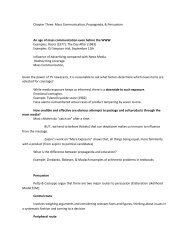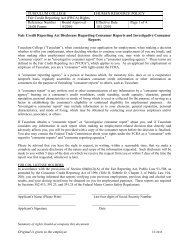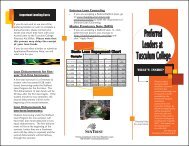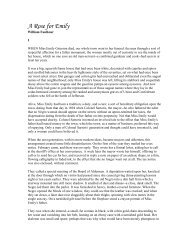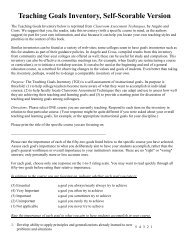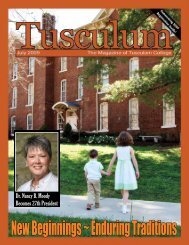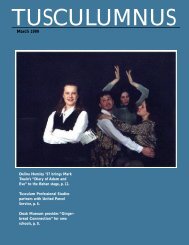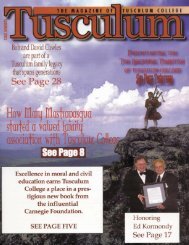WANTED
wanted - Tusculum College
wanted - Tusculum College
- No tags were found...
You also want an ePaper? Increase the reach of your titles
YUMPU automatically turns print PDFs into web optimized ePapers that Google loves.
Dr. Jennifer Brooks becomes an author<br />
A member of Tusculum College’s history faculty<br />
has published a scholarly book, “Defining the<br />
Peace,” that explores the impact of World War II service<br />
upon the political and social views of Georgia<br />
veterans from a variety of backgrounds.<br />
The subtitle of the book by Dr. Jennifer Brooks,<br />
associate professor of history at Tusculum College,<br />
is “World War II<br />
Veterans, Race, and<br />
the Remaking of<br />
Southern Political<br />
Tradition.” It is<br />
published by The<br />
University of North<br />
Carolina Press in<br />
Chapel Hill and became<br />
available in<br />
December 2004.<br />
The 256-page illustrated<br />
book is<br />
available in a hardback<br />
and paperback.<br />
“When Georgia’s<br />
servicemen left for<br />
the combat theaters<br />
Dr. Jennifer Brooks signs a copy of her of World War II,<br />
new book at a reception held to celebrate few anticipated<br />
its publication in fall 2004.<br />
how profound an<br />
impact this experience<br />
would have on their lives. By the war’s end,<br />
however, many of Georgia’s veterans felt sure they<br />
knew exactly what their military service had meant,”<br />
Dr. Brooks wrote in the book’s introduction.<br />
For many Georgia veterans, Dr. Brooks’ research<br />
found, the war experience created an awareness of<br />
both what they were obliged to give their society<br />
and what their society was obliged to give them. An<br />
illustration of the latter effect cited in the book is the<br />
case of black veteran Doyle Combs, who was<br />
maimed during the war.<br />
“The extreme personal sacrifice made by Doyle<br />
Combs, a black veteran, fueled a deep determination<br />
to seize the political rights that he had just<br />
fought in a Jim Crow army to defend,” Brooks wrote.<br />
She quoted Combs: ”’I went in combat, and I lost a<br />
portion of my body for this country when I didn’t<br />
have no right to fight whatsoever cause I didn’t have<br />
no rights in the United States of America, as a black<br />
man.’ Thus, ‘I was going to vote regardless [of] what<br />
it take.’ (sic) Putting his life on the line—literally—<br />
to defend the American way of life earned Combs<br />
the right to at least some measure of political freedom<br />
when he returned,” wrote Brooks.<br />
For white veteran John Sammons Bell, survival of<br />
terrible war experiences created in him a strong<br />
sense of “civic and political obligation,” Brooks<br />
wrote. “After making it through the horrific invasion<br />
of Guadalcanal in 1942, Bell and his buddies<br />
made a pledge as the next deadly phase of islandhopping<br />
operations against the Japanese loomed:<br />
‘everyone of those four soldiers said when we get<br />
back home,’ Bell explained, ‘we are going to do our<br />
best to make America a better America,’” wrote<br />
Brooks.<br />
When none of Bell’s comrades made it home<br />
alive, Bell’s sense of civic obligation heightened.<br />
He explained at a Georgia political rally in 1946<br />
that he felt it “a bounden duty to carry on their<br />
fight for good government …” and to “continue<br />
in peace to fight for the things we fought for in<br />
war.”<br />
Wartime military service “heightened veterans’<br />
sense of themselves — of who they were and where<br />
they fit into postwar political life,” Brooks wrote.<br />
“… (T)he war tended to strengthen the historic connection<br />
between male identity and political rights.<br />
Thus, both black and white veterans believed that<br />
they had earned the right to participate in determining<br />
the state’s future.<br />
“That veterans of both races registered the war’s<br />
impact in such similar fashion made for a particularly<br />
volatile postwar climate. The Jim Crow South<br />
wove political, racial, and gender identities tightly<br />
together, making the question of expanded civic<br />
participation a highly racialized one,” she wrote.<br />
Brooks contends, “the war produced a politics of<br />
change fraught with contradiction. If black veterans<br />
wanted racial equality, progressive white veterans<br />
prioritized majority rule over desegregation. If white<br />
union veterans wanted an organized voice on the<br />
shop floor with the political influence to match it,<br />
white pro-modernization veterans believed that the<br />
importance of recruiting new industry to the state<br />
precluded unionization. “<br />
Dr. Brooks’ 2004-2005 colleagues in the Tusculum<br />
College History Department, Dr. John Ellisor<br />
and Dr. Donal Sexton, are also working on scholarly<br />
books for the university press market.<br />
52<br />
•




